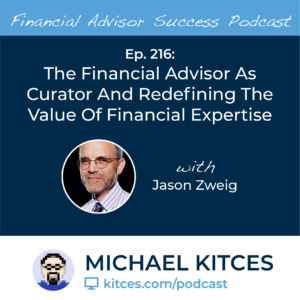Enjoy the current installment of "Weekend Reading For Financial Planners" – this week's edition kicks off with the big industry news that Apex Clearing is going public via a SPAC and in the process will raise a massive $850M of cash to reinvest into its custody and clearing services, with a particular eye on pivoting away from its roots in serving as a back-end platform for robo-advisors and instead bringing its 'tech-savvy custodian' solution to take on the oligopoly of current RIA custodians including Schwabitrade, Fidelity, and Pershing.
Also in the news this week is some buzz that state regulators are taking a closer look at the rise of 'alternative' advisor business models like monthly subscription fees and scrutinizing whether clients are really receiving services commensurate with the ongoing fees that they're paying... and in the process are discovering that the potential of "fees for no service" may be a problem in the currently popular AUM model as well.
From there, we have several articles on advisor compensation and career tracks:
- The latest Schwab Advisor Compensation study, which finds there's a rapidly emerging 'war for talent' that is causing compensation for experienced advisors to spike
- More and more large advisory firms are beginning to develop internal career paths, as it becomes increasingly appealing for firms to attract and develop young talent themselves
- How equity is becoming more common as a component of advisor compensation, but usually still with some level of buy-in attached
We've also included a number of articles focused on improving a firm's client experience, including:
- Tips from the "Book Of Wow" on how to create not just good client service but "Wow" client experience moments
- How it's the first four points of contact with an advisory firm that set the tone for the entire relationship
- The importance of taking a hard look at a firm's initial onboarding experience to help set and manage expectations
- A discussion of what really is the "ideal" number of clients for a financial advisor to have (and really be able to serve effectively)
We wrap up with three final articles, all around the theme of what it takes to really create value for clients:
- How medicine shows us that some of the best and most impactful advice is really just about helping people actually implement the simple habits that truly matter
- Why having difficult conversations is becoming a key skill for financial advisors to hone
- Why there's so much value in not just paying for expertise itself but having a relationship with an expert on an ongoing basis... which helps to explain why, despite all the naysayers, the AUM model continues to rise and advisory fees have remained so resilient in the face of the ongoing threat of fee compression?
Enjoy the 'light' reading!

 Welcome back to the 217th episode of the Financial Advisor Success Podcast!
Welcome back to the 217th episode of the Financial Advisor Success Podcast! Welcome back to the 216th episode of the Financial Advisor Success Podcast!
Welcome back to the 216th episode of the Financial Advisor Success Podcast!
